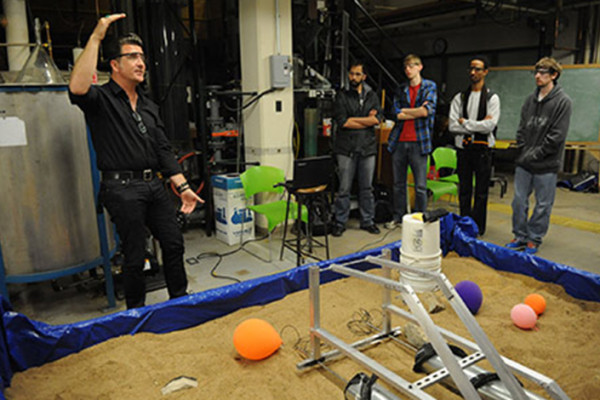Celebration Weekend welcomes about 600 admitted students, family members
Celebration Weekend starts today and runs through Saturday, April 12. About 600 students and their families will tour campus, meet current students and faculty, learn more about research and academic opportunities and enjoy performances from a variety of multicultural groups.
Gary Sumers: Finding your balance
On Friday, April 11, Washington University in St. Louis will break ground on the new Gary M. Sumers Recreation Center. The center is part of a $54 million renovation and expansion of the university Athletic Complex — the first significant update since 1985.
Kidder installed as the Edward S. and Tedi Macias Professor
Anthropologist Tristram Kidder, PhD, was installed April 7 as the Edward S. and Tedi Macias Professor in Arts & Sciences during a ceremony in Holmes Lounge, Ridgley Hall. Kidder has served as chair of the Department of Anthropology since 2008.
Keeping the humanities vital: Holden Thorp to deliver Phi Beta Kappa/Sigma Xi Lecture
In an American Academy of Arts & Sciences report called “The Heart of the Matter,” the academy argues that the humanities and social sciences are necessary for a vibrant, competitive and secure nation. This is not the usual argument for the humanities, and that’s a good thing, according to WUSTL Provost Holden Thorp, PhD. He will give the annual Phi Beta Kappa/Sigma Xi lecture on April 17, titled “From Salesman to Hamletmachine: The Need for the Humanities.”
From Jason Collins to Michael Sam: Examining ‘watershed’ moment in American sports
A symposium exploring social and cultural issues at the intersection of professional sports, race, gender and sexual identity will attract leading scholars and book authors to Washington University in St. Louis on April 11.
‘500 Clown Trapped’ at Edison April 12
At once bouncy and philosophical, 500 Clown combines acrobatics, circus arts, commedia dell’arte and in-your-face improvisation to create a unique brand of physical, action-packed theater. On Saturday, April 12, the Chicago troupe will return to Edison with “500 Clown Trapped,” its first all-ages show.
Mozart’s ‘Requiem’ April 13
A mysterious stranger arrives with a mysterious commission. The fevered composer fears the work may foreshadow his own demise. Mozart’s “Requiem” in D minor is perhaps the most mythologized work by the most mythologized composer in classical music. On April 13, the WUSTL Choirs and Symphony Orchestra will perform the “Requiem” as part of the 2014 Chancellor’s Concert.
Sarah Shun-lien Bynum April 8 and 10
Ms. Beatrice Hempel, teacher of seventh grade, is new—new to teaching, new to the school, newly engaged, and newly bereft of her idiosyncratic father. Grappling awkwardly with her newness, she struggles to figure out what is expected of her in life and at work. So begins Ms. Hempel Chronicles, the acclaimed second novel by Sarah Shun-lien Bynum. On April 8 and 10, Bynum will present a pair of events for The Writing Program in Arts & Sciences.
Robots on Mars
Before his Assembly Series talk, Adam Steltzner, a NASA engineer in charge of the Mars Curiosity rover landing, met with WUSTL students and discussed their entry for NASA’s Robotic Mining Competition.
Leading Shakespeare scholar to discuss ‘Shakespeare at 450 Years’
Jonathan Bate, PhD, one of the world’s leading scholars of Shakespeare, will discuss “Shakespeare at 450 Years” at 2:30 p.m. Monday, April 7, in Hurst Lounge, Duncker Hall, at Washington University in St. Louis. Bate, who is well known as a biographer, critic, broadcaster and scholar, is provost of Worcester College and professor of English literature at the University of Oxford.
View More Stories

